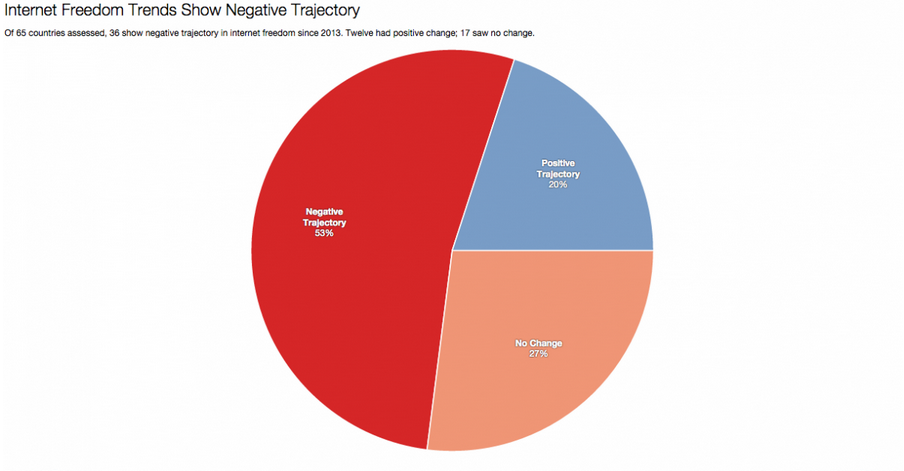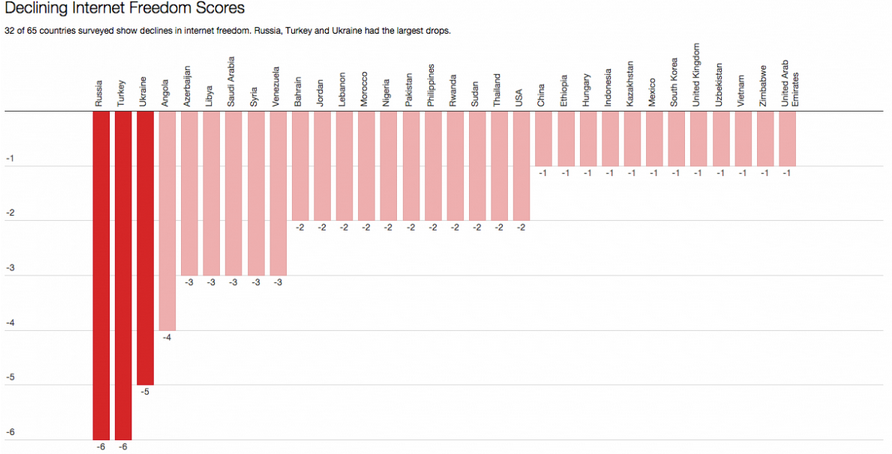Global Internet Freedom On The Decline In 2014
A recent Freedom House report stated that Internet freedom dropped in 2014 because of new laws in many countries that criminalize certain Internet content and dissent. Freedom House is worried that this will create a snowball effect, with more and more countries wanting to pass similar laws. Eventually, a restrictive Internet could be the new status quo, globally.
According to the organization, between May 2013 and May 2014, 41 countries passed laws to restrict free speech online, increase their governments' control over the Internet, or expand their surveillance capabilities.
In 38 of the 65 surveyed countries, there have been arrests related to social or political speech online. This has been happening especially in the Middle East and North African areas, where 10 out of the 11 countries surveyed from that region had detained people for online political speech.
In countries such as Syria, Turkey, Ukraine and Egypt, citizen journalists have been attacked when trying to document anti-government protests. In other countries, governments stepped up Web regulation to identify who posts online. Russia and Vietnam passed laws that allow their prosecutor general to block "extremist" content without any judicial oversight. In the U.S., some states are using the NSA spying revelations as an excuse to augment their own surveillance capabilities.
Freedom House is also concerned about a few more trends. One is that after the NSA revelations, more countries are trying to force companies to store data locally. Although this could protect their citizens' data from U.S. government access, it also allows repressive regimes to acquire data on their citizens that they previously couldn't access, because the companies had their data centers elsewhere. Such data could now be available even to local law enforcement in some countries.
In 32 out of the 65 examined countries, government critics and human rights activists have been spied upon by governments with malware.
Freedom House said that despite the global decline in Internet freedom, civil rights groups have started pushing back harder after the NSA revelations, and some Internet freedom campaigns have even managed to gather the necessary momentum to succeed.
Get Tom's Hardware's best news and in-depth reviews, straight to your inbox.
Follow us @tomshardware, on Facebook and on Google+.
Lucian Armasu is a Contributing Writer for Tom's Hardware US. He covers software news and the issues surrounding privacy and security.
-
I'd be okay with limiting free speech if it meant that there would be less cyberbullying online. People shouldn't be able to do or say anything harmful without any consequences. Just like in the real world, people do go to jail for such things, and they are restricted in what kinds of stuff they can say as well (eg. no verbal threats, violence, or otherwise harmful behavior).Reply
-
thefiend1 ReplyI'd be okay with limiting free speech if it meant that there would be less cyberbullying online.
Once you start down this line it will become harder to regain that freedom. That goes for anything. -
billgatez ReplyI'd be okay with limiting free speech if it meant that there would be less cyberbullying online.
So you are okay with the government snooping through your private information and censoring things that go aganset there plans or views?
I am all for preventing cyberbullying. But this is not the way to do it. -
leeb2013 Reply14743570 said:I'd be okay with limiting free speech if it meant that there would be less cyberbullying online. People shouldn't be able to do or say anything harmful without any consequences. Just like in the real world, people do go to jail for such things, and they are restricted in what kinds of stuff they can say as well (eg. no verbal threats, violence, or otherwise harmful behavior).
The reason you got negd is because people like to say whatever they want about other people these day, no matter how hurtful or damaging as long as they can remain behind the anonymous barrier of the internet. They think they should be able to say stuff that they wouldn't if their identity is know as they would end up in jail. That's the way society is going. Do and say whatever you want, without a thought for any one else and without consequence. It's now becoming the norm, so when you ask people to be decent, you are seen to be in the wrong. Harmful online attacks on people is nothing to do with freedom of speech, but it's now seen that way. -
eriko I guessed you've never heard of Edward Snowden, nor the NSA.Reply
Engage mind before keyboard. -
qlum Interestingly to make a point freedom is in decline yet don't take up Scandinavia and the Benelux which generally move in the other directionReply -
salmansheikh @leeb2013 You are absolutely right, now a days people have no ethics. The anonymity of the internet has liberated everyone; and this isn't a good thing at all. People are not smart enough to handle that much freedom.Reply -
dstarr3 There are two parts to being a socially responsible human being:Reply
1) Not running around saying stupid things to people
2) Being able to ignore people that do run around saying stupid things
If you think free speech should only extend to things worth saying, you're not doing your part as a socially responsible human being.

